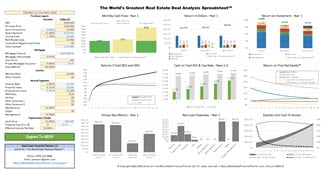When you’re in the market for a rental property, finding the right mortgage lender is as crucial as locating the perfect property. The terms of your mortgage can significantly affect the profitability and cash flow of your investment. Here’s a comprehensive guide on comparing mortgage lenders, specifically tailored for real estate investors eyeing long-term rental properties.
Understand Your Investment Goals
Before diving into the specifics of mortgage lenders, it’s essential to clarify your investment goals. Are you looking for cash flow, appreciation, or a bit of both? Your investment strategy will influence the type of mortgage that best suits your needs.
Key Factors to Consider When Comparing Mortgage Lenders
- Interest Rates: Even a slight difference in rates can significantly impact your monthly payments and the overall cost of the loan. Look for the best rates, but also consider the type of rate (fixed vs. adjustable) that aligns with your investment timeframe.
- Lender Fees: Origination fees, application fees, and other charges can add up. Compare these costs among lenders to ensure you’re getting a competitive deal.
- Loan Terms: The length of the loan and the amortization schedule can affect your cash flow. Shorter terms usually have higher payments but lower total interest costs.
- Flexibility on Down Payment: Investment properties typically require a larger down payment than primary residences. Some lenders may offer more flexibility than others, affecting your upfront cash outlay and return on investment.
- Prepayment Penalties: If you plan to refinance or pay off your mortgage early, it’s important to know if there are any penalties for doing so.
- Qualification Criteria: Lenders vary in their requirements for credit score, income, and debt-to-income ratios. Ensure you meet the criteria before diving deep into the application process.
Special Considerations for Rental Properties
- Rental Income Consideration: Some lenders are more favorable towards investors and will consider potential rental income when qualifying you for a loan. This can be particularly beneficial for covering mortgage payments.
- Investment Property Rates: Interest rates for investment properties are generally higher than those for primary residences. Compare lenders to find the best rate for your investment scenario.
- Lender Experience with Investors: Working with a lender that has a strong track record with investors can make the process smoother. They can offer valuable advice and tailored products for rental properties.
Tips for a Smooth Lender Comparison Process
- Collect quotes from multiple lenders to ensure a broad comparison.
- Consider the reputation and reliability of the lender. Online reviews and referrals from other real estate investors can provide insights into their customer service and efficiency.
- Use mortgage comparison tools and calculators to understand the long-term implications of different mortgage options.
- Don’t overlook local banks and credit unions, which may offer competitive rates and more personalized service.
Conclusion
Choosing the right mortgage lender for your rental property investment requires thorough research and comparison. By focusing on interest rates, fees, loan terms, and lender experience with investment properties, you can secure a mortgage that aligns with your investment goals and maximizes your returns. Remember, the right lender can make a significant difference in the success of your real estate investment.
